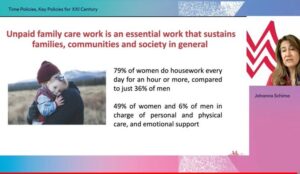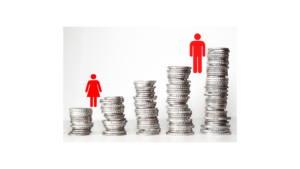Time Poverty and the Motherhood Penalty – Unveiling Economic and Social Injustices
09.07.24
Mothers play an essential role in families by ensuring their loved ones are nourished, educated, and healthy, but their unpaid care work often leads to economic and social injustices, known as the motherhood penalty.

At the recent event organised by the Time Use Initiative (TUI), Make Mothers Matter explored the interconnected issues of time poverty and the motherhood penalty, highlighting their impacts and suggesting steps for redress.
Unpaid family care work
In Europe, women, primarily mothers, perform the majority of unpaid work. According to the European Institute for Gender Equality (EIGE), 79% of women do daily housework for an hour or more, compared to 36% of men. Women also bear the brunt of specific care activities, with 49% providing personal and physical care versus 6% of men. This imbalance affects mothers’ pay, pension rights, employment opportunities, career advancement, professional skills, social activities, education, health, and that of their children.
The motherhood penalty and the time poverty
This is usually referred as the Motherhood penalty: The economic penalties and discriminations women encounter when having children. The gender gaps start with the arrival of the first child and increase as the number of children increases. And time poverty further adds to the motherhood penalty.
 In fact, time poverty, or the lack of sufficient time to balance paid work and unpaid care work, exacerbates this penalty. In the EU, the gender pay gap stands at 12.7%, and the pension gap at 29%, increasing women’s likelihood of poverty as they age. Moreover, 40% of women in the EU face obstacles in education and training due to family responsibilities, and 57% cannot change their work schedule.
In fact, time poverty, or the lack of sufficient time to balance paid work and unpaid care work, exacerbates this penalty. In the EU, the gender pay gap stands at 12.7%, and the pension gap at 29%, increasing women’s likelihood of poverty as they age. Moreover, 40% of women in the EU face obstacles in education and training due to family responsibilities, and 57% cannot change their work schedule.
Addressing Inequities
EU parliamentarian Lina Gálvez Muñoz’s 2022 report on women’s poverty in Europe – to which MMM contributed – highlights that the unequal division of unpaid work reduces women’s labor force participation and increases their involvement in precarious employment. She stresses that poverty, worsened by time poverty, arises from many interconnected factors, not all monetary.
Vulnerable groups at higher risk of poverty include single mothers, with 85% of single-parent families headed by women and 42.1% of single-parent households at risk of poverty or social exclusion in 2020, and mothers of retirement age, who face higher poverty risks due to reduced working hours or labor market exit for caregiving.
Recognizing and valuing care work
While providing care, mothers develop valuable soft skills enhancing social inclusion, personal development, and employability, but these skills are undervalued. Governments, civil society, and businesses must work collectively to recognize, reduce, and redistribute unpaid care work.
Some of MMM‘s recommendations to support mothers and their families include:
- Implementing longer and adequately paid leaves: To allow parents to care for their children without economic or professional penalties.
- Promoting active fatherhood: Ensure fathers can take an active role in child-rearing by addressing factors like compensation, childcare availability, and cultural norms.

- Flexible working arrangements: Enforcing the right to request flexible working arrangements, for mothers and fathers.
- Providing accessible, affordable and high-quality childcare services and supporting other forms of childcare, that are family- centred and respectful of families’ choices and children’s development (e.g. community-based childcare services, gardienne, childminder)
- Care credits for pension entitlements: Introducing care credits to account for employment breaks due to caregiving, ensuring fair pension entitlements.
- Life-Cycle approach to employment: Supporting a non-linear career approach allowing reentry into the labor market without penalties.
- Incentivise family-friendly policies: Encouraging employers to adopt family-friendly policies and certification programs. Such as the initiative for family friendly companies, Be Family and the certificate in conciliation from Mas Familia.
- Validate caregiving skills: Developing mechanisms to recognise and value parental skills in the labor market.
- Collect comprehensive data: Designing a gender-sensitive European Time Use Survey to collect data on paid and unpaid care work.
- Recognise unpaid care work: Defining “work” holistically, combining paid and unpaid work, and ensuring access to social rights.
MMM advocates for a comprehensive set of solutions to reimagine our priorities and enhance the lives of mothers and all caregivers. Acknowledging the indispensable role of care in our societies and addressing the numerous injustices faced by mothers.
As MEP Lina Gálvez Muñoz stated (Women’s Committee EU Parliament hearing on June 15, 2021) “the fight against women’s poverty is not just about equality and social justice, it is a path to fight against childhood poverty and therefore working for a dignified future for everyone.”
 Our current economic system fails to support women, particularly mothers, as unpaid care work lies at the core of gender inequalities and discrimination. We must ensure that the involvement of mothers and fathers in the labor market aligns with both personal and societal development, rather than merely serving economic demands.
Our current economic system fails to support women, particularly mothers, as unpaid care work lies at the core of gender inequalities and discrimination. We must ensure that the involvement of mothers and fathers in the labor market aligns with both personal and societal development, rather than merely serving economic demands.
The UN Secretary-General Antonio Guterres stated, our flawed system must recognize that unpaid care work is indeed work and that free markets alone cannot deliver health and well-being for all.
It is therefore time to address the motherhood penalty and the time poverty of mothers.
Supporting mothers and fathers in their caregiving roles should not be viewed as expenses to be minimised but as vital investments that contribute to the wellbeing of individuals and the planet.
The New EU Gender Equality Roadmap : A Call for Inclusion of Mothers
04.03.25
The European Commission’s initiative on a new Gender Equality Roadmap post-2025, marks a significant step forward in addressing gender disparities across the European Union. Make Mothers Matter (MMM
Breaking the Cycle: Gender Equality as a Path to Better Mental Health
18.03.25
The Council of the European Union has taken a decisive step in recognising the vital connection between gender equality and mental health.
Europe Must Listen to Mothers: Our landmark report heads to the European Parliament
28.08.25
On 22 September 2025, the voices of mothers will take centre stage in Brussels. For the first time, Make Mothers Matter (MMM) will present its State of Motherhood in Europe








